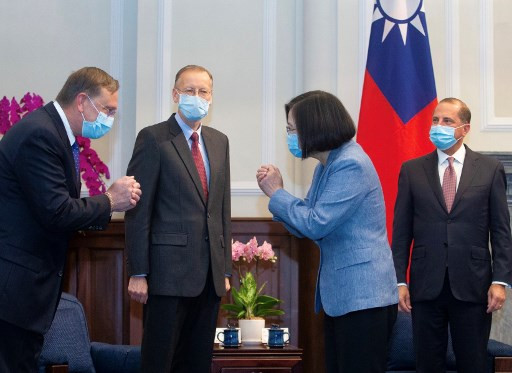Popular Reads
Top Results
Can't find what you're looking for?
View all search resultsPopular Reads
Top Results
Can't find what you're looking for?
View all search resultsUS approves sale of weapons systems totaling $1.8 billion to Taiwan
Beijing swiftly responded to the US action, saying it has seriously interfered in China's internal affairs as well as undermined its sovereignty and security interests.
Change text size
Gift Premium Articles
to Anyone
 Taiwan's President Tsai Ing-wen (2nd R) gestures to a US official (left) as US Secretary of Health and Human Services Alex Azar (right) and director of the American of Institute in Taiwan, Brent Christensen (second left), look on during their visit to the Presidential Office in Taipei on August 10, 2020. - The US cabinet member met Taiwan's leader on August 10 during the highest level visit from the United States since it switched diplomatic recognition from the island to China in 1979, a trip that Beijing has condemned. (Pool/AFP/Pei Chen)
Taiwan's President Tsai Ing-wen (2nd R) gestures to a US official (left) as US Secretary of Health and Human Services Alex Azar (right) and director of the American of Institute in Taiwan, Brent Christensen (second left), look on during their visit to the Presidential Office in Taipei on August 10, 2020. - The US cabinet member met Taiwan's leader on August 10 during the highest level visit from the United States since it switched diplomatic recognition from the island to China in 1979, a trip that Beijing has condemned. (Pool/AFP/Pei Chen)
T
he US government said Wednesday it approved the sale of three weapons packages to Taiwan for a total of $1.8 billion, a move that could add further tension to souring US-China relations.
Beijing swiftly responded to the US action, saying it has seriously interfered in China's internal affairs as well as undermined its sovereignty and security interests.
One of the packages would provide the self-ruled island, which perceives a growing threat from mainland China, 135 standoff land attack missiles, related equipment and technical assistance costing more than $1 billion.
"This proposed sale serves US national, economic, and security interests by supporting the recipient's continuing efforts to modernize its armed forces and to maintain a credible defensive capability," the Defense Department said in a statement.
The administration of President Donald Trump has been stepping up its support to Taiwan amid a widening US-China confrontation on issues including trade, technology, Hong Kong's autonomy, human rights issues and the control over the South China Sea.
In Beijing, Chinese Foreign Ministry spokesman Zhao Lijian told reporters that the US decision has "seriously damaged peace and stability across the Taiwan Strait," adding, the nation "firmly opposes this."
"We urge the United States to fully recognize the serious harm of the US arms sales to Taiwan, abide by the one-China principle," he said. "China will respond in an appropriate and necessary manner in accordance with the development of the situation."
Earlier Thursday, the Taiwanese government thanked Washington for keeping its promise to help Taiwan boost its defenses amid increased Chinese military intimidation.
"The US government's provision of the defense weapons will help Taiwan strengthen its defense capability and enhance its asymmetrical capability so Taiwan can have more confidence in defending peace and stability in the Taiwan Strait and the Asia-Pacific region," Presidential Office spokesman Xavier Chang said in a statement.
He said Taiwan will continue to deepen the cooperative partnership with the United States and other like-minded countries to jointly safeguard Taiwan's democratic freedoms as well as peace, stability and prosperity in the Indo-Pacific region.
Meanwhile, Defense Minister Yen De-fa told a legislative committee that Taiwan has no intention to engage in an arms race with China and that the purchase deal is in line with defense needs.
Defense Ministry Deputy Chief of Staff Lt. Gen. Chiu Shu-hua told the committee that the number of incursions by China's warplanes and military vessels in the vicinity of Taiwan has increased by 50 percent this year.
"The intention of the Communist Party of China is to turn harassment into the norm and exhaust our defense resources," Chiu said.
Taiwan and China have been governed separately since they split during a civil war in 1949. Beijing, which regards Taiwan as a renegade province, has since endeavored to bring the island into its fold.
In August, the Trump administration upset Beijing by sending Health and Human Services Secretary Alex Azar to Taiwan to hail the island's success in fighting the coronavirus pandemic.
Azar became the most senior US official to visit Taiwan since 1979, when Washington switched its diplomatic recognition from Taipei to Beijing.









